Care Workers in Wales receive real Living Wage uplift after Welsh Government pledges £70 million
Care Workers in Wales receive real Living Wage uplift after Welsh Government pledges £70 million
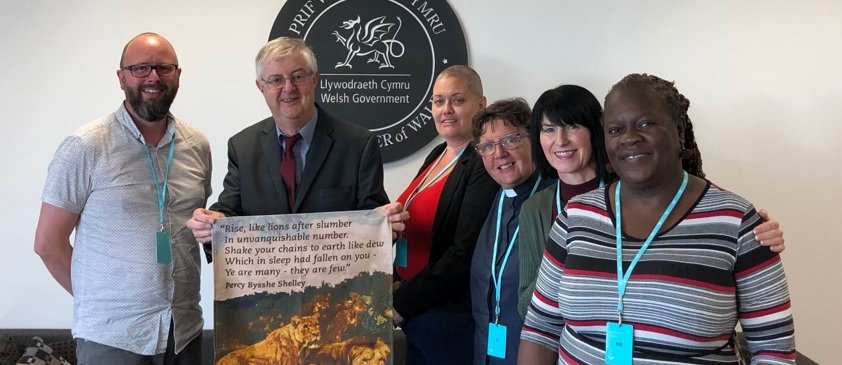
Care workers across Wales celebrated the news that the Welsh Government have pledged £70 million to ensure all care workers in Wales receive a real Living Wage.
The wage uplift, of £10.90 an hour, comes into effect from June 2023, impacting over 50,000 staff.
For Citizens Cymru Wales, this win has been almost ten years in the making.
So, how did it begin?
The campaign for a real Living Wage for care workers in Wales began in 2014, after Citizens Cymru Wales set out to gain a deeper understanding of some of the issues facing local communities.
They ran a listening campaign that involved speaking to many local member institutions and organisations. One of the biggest findings from these conversations came from Churches that ran food banks, who explained the number of care workers needing access to their food banks was rising at an alarming rate.
It became clear that the impact of low pay in the care sector was felt across Wales. Local community leaders a part of Citizens Cymru Wales decided that enough was enough – they wanted to take action.
How fresh leadership led to a new opportunity...
Whilst the campaign initially set out targeting local authorities, this route proved to be unsuccessful with austerity being continually cited as a barrier to paying care workers a real Living Wage. After a few years of slow progress, it became clear a new approach was needed, as was a new target.
In December 2018, Mark Drakeford, the former Health Minister, was elected as the new First Minister of Wales. During his time as Health Minister, Drakeford defended and promoted the Bevanite founding principles of an NHS, especially when it came to valuing all those who work under it. His newly elected position brought with it the perfect opportunity to build relational power with an influential figure, one whose values seemingly aligned with those of the campaign and the people of Wales.

In January 2019, Mark Drakeford attended his first Citizens Cymru Wales Accountability Assembly, his first engagement with civil society since being elected First Minister. At the assembly, care workers shared powerful testimony about their struggles with low pay, and discussed the transformative impact that earning a real Living Wage would have not just on their lives, but on the social care sector as a whole.
On this day, the First Minister of Wales promised he’d work with those involved in the campaign to revolutionise social care.
Turning a hurdle into an advantage...
The next plan of action was to focus on growing the campaign.
Local alliances across Wales held care conversations with people in local areas to discuss the real Living Wage and understand what care means to people in their communities. However, this was brought to a halt with the emergence of the Covid-19 pandemic.
Whilst this initially came as an unexpected stumbling block, it ended up allowing for messaging and support for the campaign to spread to places and people that weren’t being reached previously.
Connecting online via Zoom made it easier to bring together care workers, care recipients, faith, education, and trade union leaders from across Wales – from Pembrokeshire to Bangor to Cardiff, Caerphilly, and the Vale of Glamorgan. The accessibility of being online allowed for immobile care recipients to join easily and for care workers to participate around their shift patterns, with the stress of traveling alleviated. This meant that people who might not have otherwise been able to be there were now able to have a seat at the table.
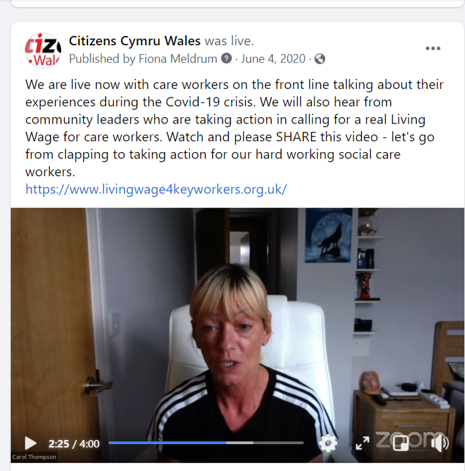
The increased spotlight on the plight of care workers during the pandemic also led to more institutions and leaders getting involved. Care conversations were live streamed on Facebook during Thursday evening’s ‘claps for heroes’, to amplify that whilst claps are symbolise appreciation, they can’t pay the bills. These were twinned with actions led by care workers, faith and education leaders and community groups outside care homes to raise awareness of the conditions care workers were working under at the time. Churches also participated in blessing care homes during these difficult times.

Moreover, Edel Anabwani, a leader at the time and previous care worker herself, ran a listening campaign dedicated to understanding the current everyday concerns of care workers during the pandemic. From this, Edel created and led bespoke training for care workers on issues around health and safety during a pandemic, mental health and wellbeing.
Simultaneously, those involved in the campaign were focused on building alliances and relationships with other organisations and leaders who were passionate about radically reforming social care in Wales. For example, relationships were built with academics working on Living Wage research at Cardiff Business School and those formulating how Wales could pay for social care, cooperatives such as Cartefi and the Wales Co-operative Centre, Social Care Wales, the National Commissioning Board, housing associations and trade unions.
Forming these relationships was a significant step towards building collective power.
A Wales-wide Social Care Summit
In January 2021, the ongoing work and built-up relational power culminated together in an online Wales-wide Social Care Summit, with First Minister Mark Drakeford in attendance. It was a significant moment for the campaign, with 2021 being an election year for the Welsh Parliament and provided the perfect opportunity to ensure Living Wage for social care was on the national agenda.
Organisations and institutions that the campaign had formed alliances with, such as Cardiff Business School and Cardiff Metropolitan University, alongside the Living Wage Foundation, laid out the case for the real Living Wage as the foundation of a revolution in social care in Wales. They were supported by care workers and care recipients whose testimony showed real lived experiences of the struggles that can occur when not earning a real Living Wage.
First Minister Mark Drakeford concluded that he had been successfully shown how this could be rolled out. He agreed that a real Living Wage must be the start of a true revolution in social care.
Whilst this was hugely promising, campaigners were still cautious regarding how much of a commitment to expect from the First Minister, given that we were still in the middle of a global pandemic.
However, just a few weeks later, it was announced that a real Living Wage in social care was one of Labour’s 6 pledges for the 2021 Senedd election, which they won! By the end of 2021, the Welsh Government committed £43 million to be rolled out by April 2022, for Welsh Local Authorities and Health Boards to pay care workers the real Living Wage.
This was a significantly huge win and proof that when we organise together, more can be achieved!
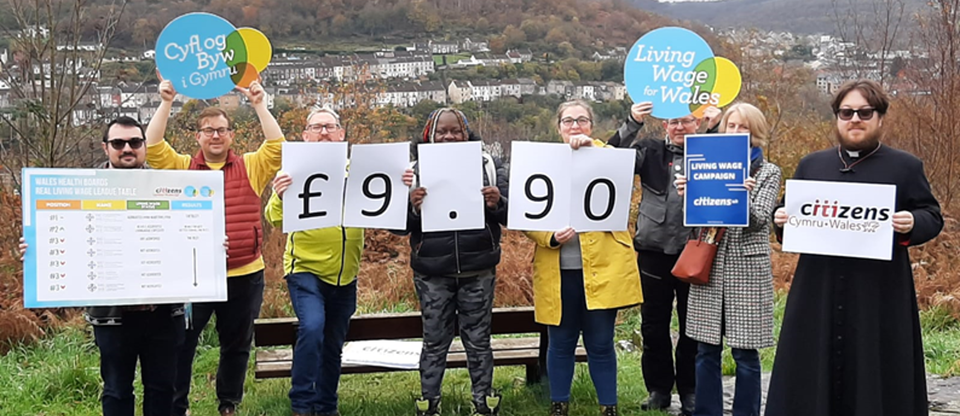
The wins kept coming...
On Valentines Day 2022, a ‘Love Your Care Worker’ event was held by leaders involved with the campaign, with Julie Morgan, Deputy minister for social care, and Hannah Blythyn, Deputy Minister for Social Partnerships, in attendance.
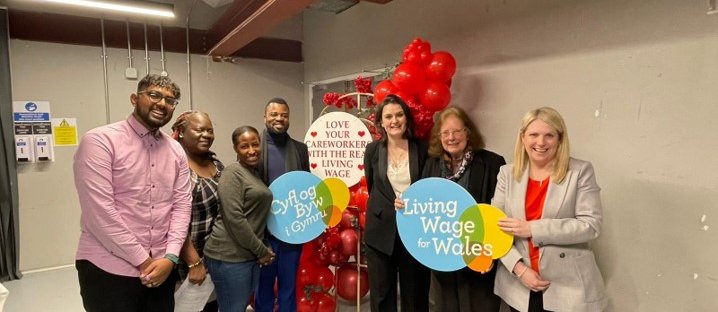
In Community Organising, it is often said that you need enough power to get the decision-makers in the room, and then even more power to get a commitment. However, it is just as important to maintain enough power to hold these decision-makers to account on their commitments.
This event was organised to not only celebrate the wins of the campaign so far, but to get further commitment from the Welsh Government towards pushing local authorities and care homes to become accredited Living Wage employers.
Not only was that achieved, but it was here that Julie Morgan, Deputy Minister for Social Care, and Hannah Blythyn, Deputy Minister for Social Partnerships, publicly committed to raising the pledge to £70 million to ensure all care workers in Wales receive a real Living Wage, which will roll out in June 2023.
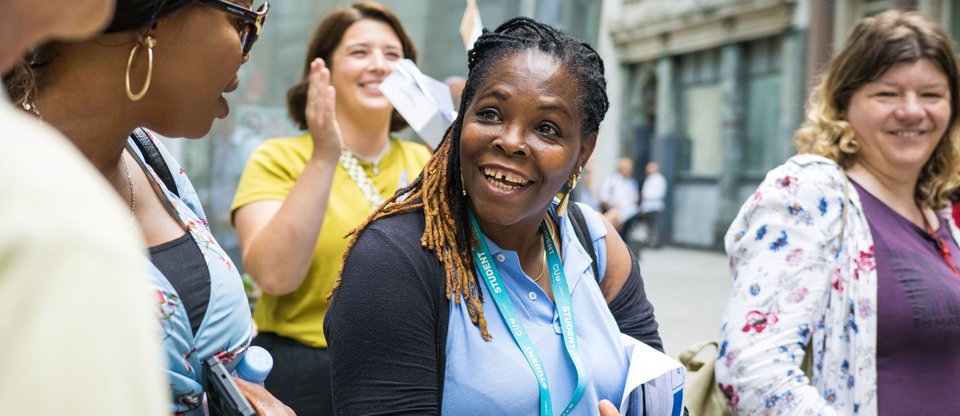
Commit to paying all staff a real Living Wage and become officially accredited with the Living Wage Foundation
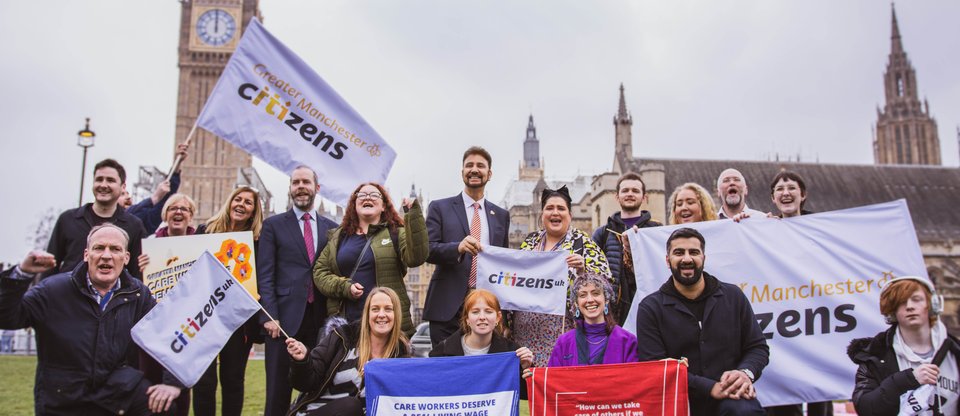
The Living Wage for Social Care is one of Citizens UK's national priority campaigns. With the rising cost of living, even more care sector workers are struggling with necessities like heating or eating. Find out more about how you can get involved in the fight for fair pay for care workers.




